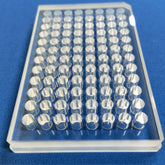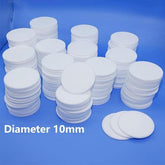How is the alkali resistance of quartz glass?
Quartz glass demonstrates good resistance to alkalis and can generally withstand low-concentration alkaline solutions such as sodium hydroxide, and potassium hydroxide.
1. The alkali resistance of quartz glass
Quartz glass, a colorless and transparent silicate glass, exhibits excellent chemical stability and is primarily composed of silicon dioxide. Unlike conventional glass, quartz glass is highly resistant to a wide range of acids and bases across varying concentrations. It is also able to withstand some alkaline solutions with low concentrations, such as sodium hydroxide, potassium hydroxide and ammonia water, due to its high purity and unique structural properties. However, its chemical stability may diminish in extreme environments, particularly under conditions of high temperature, high pressure, or exposure to strong acids and strong alkalis.
2. The performance of quartz glass in alkaline solutions
The influence of alkaline solutions with varied concentrations on quartz glass is primarily determined by its chemical properties. At lower alkaline concentrations, quartz glass maintains excellent chemical stability. However, when solution concentration exceeds a critical threshold, a significant reduction in material integrity occurs. For instance, sodium hydroxide solutions with concentrations of no more than 10% nearly elicit no deterioration of quartz glass. Notably, when sodium hydroxide concentration surpasses 15%, corrosion becomes easily evident on quartz glass, leading to surface degradation and structural failure through cracking phenomena. Whereas, potassium hydroxide solutions exhibit a notably stronger corrosive action on quartz glass under equivalent concentration conditions.

3. Problems to be noted in the practical application of quartz glass
In practical applications, the durability of quartz glass is closely related to the usage conditions. Heating quartz glass, for example, can weaken its chemical stability, making it more susceptible to chemical reactions in high-temperature and high-pressure environments, which can alter its physical and chemical properties. In addition, quartz glass has a relatively high hardness, but it is also easily affected by mechanical action. Therefore, it is necessary to avoid severe vibration and collision. In addition, quartz glass is also susceptible to factors such as humidity, moisture and oxidation. Therefore, during storage and transportation, it is essential to take measures to prevent moisture, shock and oxidation.
In conclusion, quartz glass is an excellent material, demonstrating remarkable stability and the capacity to effectively resist alkaline solutions, with the level of resistance directly proportional to the concentration of the solution. In practical applications, a comprehensive consideration and assessment of its usage environment are necessary to prevent unnecessary losses and accidents.






